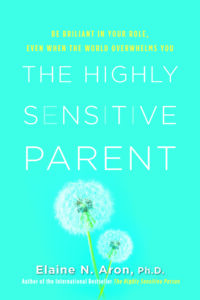THE HIGHLY SENSITIVE PARENT: Be Brilliant in Your Role, Even When the World Overwhelms You By Elaine Aron, Ph.D. (Book Excerpt)
 Emotional Regulation
Emotional Regulation
Since you are going to feel more deeply as a parent because of your innately greater emotional responsiveness, you need to become an expert in emotional regulation. Because of your depth of processing, once you have thought through emotional regulation, I think you’ll be better at it than others.
“Affect regulation” and “emotional regulation” are fancy psychological terms for any method that you might try, consciously or not, to change the otherwise spontaneous flow of your emotions—to increase, prolong, or decrease a feeling to make it appropriate for the situation. Because the human brain is designed to do this quite well, and probably the HSP’s brain even more so, you already know quite a bit about emotional regulation just from having lived awhile with other people. But it never hurts to make it more conscious.
Perhaps the biggest reason to become more familiar with your emotional regulation methods is that you are teaching them to your child. If they see you losing control often, they will learn that is how to respond to emotions, and you may end up dealing with a highly dramatic, intense child for the rest of your life. Your child’s temperament also plays a large part in this, but if you have an emotionally intense child, that is all the more reason to develop emotional regulation in both of you.
An infant relies on you entirely for emotional regulation— the caregiver is the only one who can increase, prolong, or decrease crying, hunger, all sorts of pain, and also joy and contentment. An infant has essentially no control over these emotions. Very young children also need help regulating fear, anger, and distress about not getting what they think they must have, for example, or losing people or things that they may think have disappeared forever before you teach them which of these will be back or return to them.
Older children will also imitate how you manage your emotions or sometimes rebel against your methods. They may, for example, replace control with dramatic expression. Again, do not overlook the role of a child’s temperament. Their emotional regulation or lack thereof is not all your doing. And remember that when parents look back, they almost always see things they wish they had done differently. The fact is, every person has “issues” that are not completely resolved and are transmitted in some form to their children.
Regulate, but Don’t Squelch or Impose
As children grow, they learn what emotions make them happy—feelings to increase or prolong, like laughter and sharing – enjoying and regulating your responsiveness and they begin to learn to stop feeling things that they don’t like. You may want to be sure that you do not essentially eliminate these emotional “colors” in your child.
Although I have said HSPs feel more, some HSPs can become expert quite early at covering up their strong feelings. This is true especially of men in cultures in which they are not supposed to show very much emotion. But there are also families and entire cultures in which strong feelings, or certain feelings, are not allowed.
If you think about it, in your family and in every family, some emotions were encouraged and others were discouraged. In some families, anger is fine, but sadness is not. In others, fear is expected, and joy is not. And so forth. You may want to think about the emotions that were not accepted in your family because you may not have many ways to work with them except not to feel them at all. If this is you, remember that increasing your awareness or expression of your emotions is another form of emotional regulation.
For our children and ourselves to have all emotions available when needed would probably be everyone’s choice. Emotions are the messages about what’s really going on inside us and around us. They tell us what we need and want, plus sometimes what others need and want by “feeling their feelings.” Repress all that and not only do you miss important knowledge, but the bottled-up physical reaction can manifest itself as chronic illnesses.
On the other hand, feeling emotionally stressed and out of control is not good for us for many reasons, and there are times when we just do not want a strong emotional reaction. So we have to find the right balance between opening up to feelings and controlling their expression. Most of us tend to lean one way, so that balance can be a challenge. But once you know what you feel, it is quite right to have some control over where, how, and for how long you deal with it. Sometimes, we want to alter how we feel in order to work better or accomplish a goal (e.g. staying calm helps you get a child dressed for school).
Sometimes, we even try to make certain ways of regulating our emotions a habit so we can have the kind of personality we want. If we want our character to be calm, fun to be with, compassionate, optimistic, friendly, polite, or simply open, we try to shape our emotional responses in that direction, keeping them authentic, but perhaps based on a particular life value or attitude. I imagine that HSPs are especially likely to refine their emotional responses and are probably better at it, so that maybe people say not just that you are highly sensitive, but also, “You’re so calm,” or “You’re really hilarious,” or “You are a truly compassionate person.” Perhaps you have been that way your entire life, but maybe you have been successful at refining your character in the emotional direction of your choice.
 ELAINE N. ARON, Ph.D. obtained her doctorate in clinical psychology from Pacific Graduate Institute and trained at the Jung Institute in San Francisco. She is widely published in academic journals on the subject of both sensory processing sensitivity and, along with her husband, Art Aron, the scientific study of close relationships. She is also the author of the groundbreaking book The Highly Sensitive Person, the 20th Anniversary edition of which is being reissued by Kensington Books in July 2020. She conducts workshops for HSPs around the country and internationally, and maintains a blog for them on her website, www.hsperson.com.
ELAINE N. ARON, Ph.D. obtained her doctorate in clinical psychology from Pacific Graduate Institute and trained at the Jung Institute in San Francisco. She is widely published in academic journals on the subject of both sensory processing sensitivity and, along with her husband, Art Aron, the scientific study of close relationships. She is also the author of the groundbreaking book The Highly Sensitive Person, the 20th Anniversary edition of which is being reissued by Kensington Books in July 2020. She conducts workshops for HSPs around the country and internationally, and maintains a blog for them on her website, www.hsperson.com.
Tags: elaine n. aron, having a famiy, having kids, later in life mother, the highly sensitive parent















